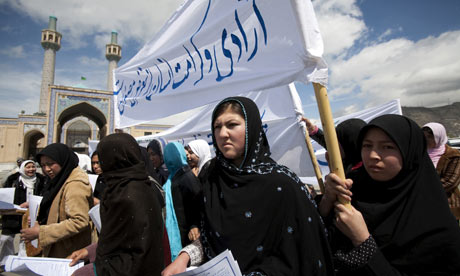Eight years after the Taliban were toppled, Janine di Giovanni returns to Afghanistan and sees how a proposed law is instilling fear in its women

Afghan women protest at the proposed new family law Photograph: Robert Nickelsberg
A few days after the Taliban were toppled in 2001 I was in Kabul. The city was jubilant and full of hope for the future, and I remember talking to some laughing teenage girls in the street. One was excited because she could now go back to school. Another sang terrible disco songs and showed me dance steps she had been practising for five years in secret. A third debated whether to take off her burka. "Is it safe enough yet?" she asked me. "For five years, I lived inside this prison."
Eight years later I returned, but the Afghanistan I found was far from jubilant. Despite the money poured into reconstruction and development, it is one of the five poorest countries in the world. There is 40% unemployment – nearly 80% in some parts of the country. A third of children under five are malnourished. Life expectancy is 43 – and it is one of only three countries in the world where women die earlier than men.
I arrived to meet women before the presidential elections next month and to talk about a new law, which if brought in, could have drastic repercussions for women. The Shia Family Planning law was signed last March by President Hamid Karzai in an attempt, many believe, to appease powerful mullahs. The Afghan constitution allows Shias to have a separate family law from the Sunni majority based on traditional Shia jurisprudence, and some think the law is linked to the August elections and the Shia electorate who would have to abide by it (they could form up to 20% of the electorate).
The proposed law led to furious protests from women's groups. It sanctioned marital rape and brought back Taliban-era restrictions on women by outlining when a woman could leave her house and the circumstances in which she has to have sex with her husband; Shia woman would be allowed to leave home alone "for a legitimate purpose" only which the law does not define, and could refuse sex with their husbands only when ill or menstruating.
Following international outrage, Karzai backtracked and said the law would be reviewed. This month it was amended and re-signed by the president, but has not yet been ratified by parliament. Human rights groups say it is unclear how much the amendments have done to improve the law. And the law has already achieved its aim – instilling fear and insecurity among an already traumatised female population.
Soraya Sobhrang, a human rights activist I meet in her Kabul office, says, "The law will affect all women if it goes through. It opens the door for other repressive laws to be passed, for Sunni Muslims as well as Shia."
A young doctor friend, Najeeb Shawal, says he is seeing more female patients who were depressed since news of the law emerged. "They have the kind of hopelessness that comes with knowing your life is incredibly repressed.
And might become more so." Read more here...
Source: The Guardian




















